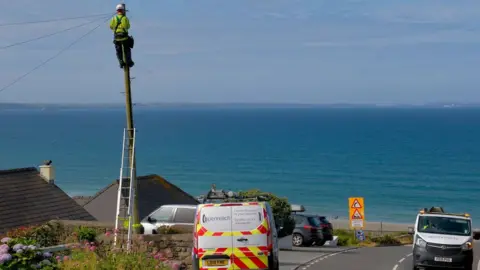Better rural internet speeds 'may not be financially viable'
 Getty Images
Getty ImagesImproving internet speeds in some of the most rural parts of Wales may not be financially viable, a Parliamentary committee has heard.
The managing director of strategic infrastructure development for Openreach, Kim Mears, said there was a question over "value for money".
Ms Mears said alternative technologies may have to be looked at.
Openreach is a division of BT responsible for the rollout and upkeep of much of the UK's broadband network.
Under the Universal Service Obligation, the company is required to act on requests to provide high-speed internet to properties with download speeds of less than 10Mbit/s.
Applicants are only required to contribute to the cost of installation if it exceeds £3,400.
But Ms Mears told the the Welsh Affairs Committee that in the hardest to reach areas, costs can be significantly higher than that threshold.
"When you look at that final half, or one per cent, the cost to connect, there is a price point. £3,400. The cost to connect is way, way, way in excess of any of that.
"I genuinely believe that we need to look at either alternative technologies, or consider, and there is a value for money question, how much we're prepared to pay to connect the final half or one per cent."
 Openreach
OpenreachThe admission follows an announcement by Virgin Media that it intends to make its gigabit service available to hundreds of thousands of people in south-east Wales.
The telecoms firm said customers would be able to receive speeds 18 times faster than average in Cardiff.
A plan to get gigabit broadband in every home by 2025 was rolled back by the UK government last week.
'Prohibitively costly'
BT's policy and public affairs director, Richard Wainer, told the Welsh Affairs Committee on Thursday that there were still around 50,000 homes in Wales without fixed line access to speeds of at least 10Mbit/s.
He added that of these, around 18,000 also did not have access to 4G, and that providing superfast speeds in these areas would be incredibly challenging.
"For these very hardest to reach premises, we are going to have to think creatively about how we serve them," he said.
"Providing a fixed line, full fibre connection to them will simply be, I think, prohibitively costly.
"Where there are other technologies that may be able to deliver a decent service, then we should really be looking at them.
"Yes, where we can get full fibre as the gold standard for connectivity, we should absolutely be pushing that.
"But there will be, inevitably, a small proportion of places where that simply is not going to be viable.
"Where other technologies can play a role, we should absolutely be exploring those."